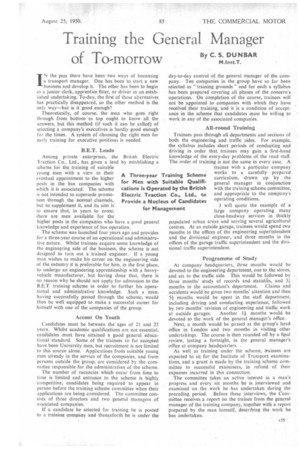Training the General Manager
Page 45

If you've noticed an error in this article please click here to report it so we can fix it.
B C. S. DUNBAR
of To-morrow m.,nst.T.
IN the past there have been two ways of becoming a transport manager. One has been to start a new business and develop it. The other has been to begin as a junior clerk, apprentice fitter, or driver in an established undertaking. To-day, the first of these alternatives has practically disappeared, so the other method is the only way—but is it good enough?
Theoretically, of course, the man who goes right through from bottom to top ought to know all the answers, but this method (if such it can be called) of selecting a company's executives is hardly good enough for the times. A system of choosing the right men for early training for executive positions is needed.
B.E.T. Leads Among private enterprises, the Traction Co., Ltd., has given a lead ;cherne for the training of suitable young men with a view to their eventual appointment to the higher posts in the bus companies with which it is associated. The scheme is not intended to supersede promo tion through the normal channels, but to supplement it, and its aim is to ensure that, in years to come, there are men available for the higher posts in the companies who have a good general knowledge and experience of bus operation.
The scheme was launched four years ago and provides for a three-year course of an operational and administrative nature. Whilst trainees acquire some knowledge of the engineering side of the business, -the scheme is not designed to turn out a trained engineer. If a young man wishes to make his career on the engineering side of the industry it is preferable for him, in the first place, to undergo an engineering apprenticeship with a heavyvehicle manufacturer, but having done that, there is no reason why he should not apply for admission to the B.E.T. training scheme in order to further his operational and administrative knowledge. Such a man, having successfully passed through the scheme, would then be well equipped to make a successful career for himself with one of the companies of the group.
Accent On Youth
Candidates must be between the ages of 21 and 25 years. Whilst academic qualifications are not essential, candidates must have attained a good general educational standard. Some of the trainees so far accepted have been University men, but recruitment is not limited to this source alone. Applications from suitable young men already in the service of the companies, and from persons outside the group, are considered by the committee responsible for the administration of the scheme.
The number of vacancies which occur from time to time is limited and entrance to the scheme is highly competitive, candidates being required to appear in person before the training scheme committee when their applications are being considered. The committee consists of three directors and two general managers of associated companies, If a candidate be selected for training he is posted to a training company and thenceforth he is under the day-to-day control of the general manager of the company. Ten companies in the group have so far been selected as "training grounds" and for each a syllabus has been prepared covering all phases of the concern's operations. On completion of the course, trainees will not be appointed to companies with which they have received their training, and it is a condition of acceptance in the scheme that candidates must be willing to work in any of the associated companies.
All-round Training
Trainees pass through all departments and sections of both the engineering and traffic sides. For example, the syllabus includes short periods of conducting and driving in order that trainees may gain a first-hand knowledge of the every-day problems of the road stall The order of training is not the same in every case. A trainee with a particular company works to a carefully prepared curriculum, drawn up by the general manager in conjunction with the training scheme committee, and appropriate to the company's operating conditions.
I will quote the example of a large company operating many close-headway services in thickly populated urban areas and serving several agricultural centres. At an outside garage, trainees would spend two months in the offices of the engineering superintendent and the divisional engineer, and three months in the offices of the garage traffic superintendent and the divisional traffic superintendent.
Programme of Study At company headquarters, three months would be devoted to the engineering department, one to the stores, and, six to the traffic side. This would be followed by three months' study of records and statistiCs, and 3; months in the accountant's department. Claims and accidents would be given two months' attention and then months would be spent in the staff department, including driving and conducting experience, followed by two months' revision of engineering and traffic work at outside garages_ Another 1 months wroild be devoted to the work of the general manager's office.
Next, a month would be passed at the group's head office in London and two months in visiting other undertakings. The course is then rounded off by a final review, lasting a fortnight, in the general manager's office at company headquarters.
As well as training under the scheme, trainees are expected to sit for the Institute of Transport examinations, and a grant is made by the training scheme coinmince to successful examinees, in refund of their expenses incurred in this connection.
The committee takes an active interest in a man's progress and every six months he is interviewed and examined on the work he has undertaken during the preceding period. Before these interviews, the Committee receives a report on the trainee from the general manager of the training company, together with a report prepared by the man himself, describing the work he has undertaken.












































































